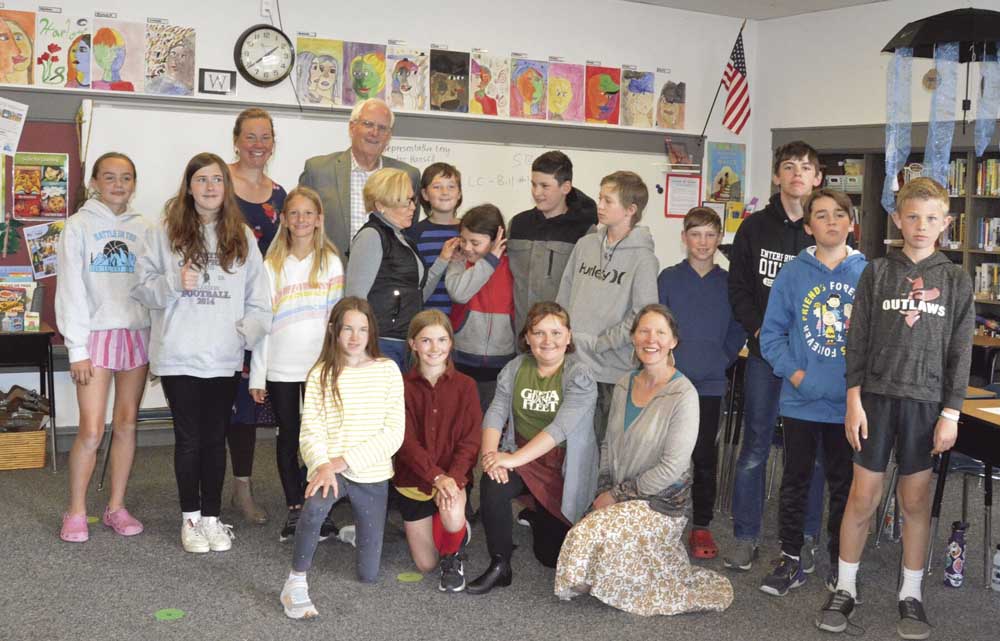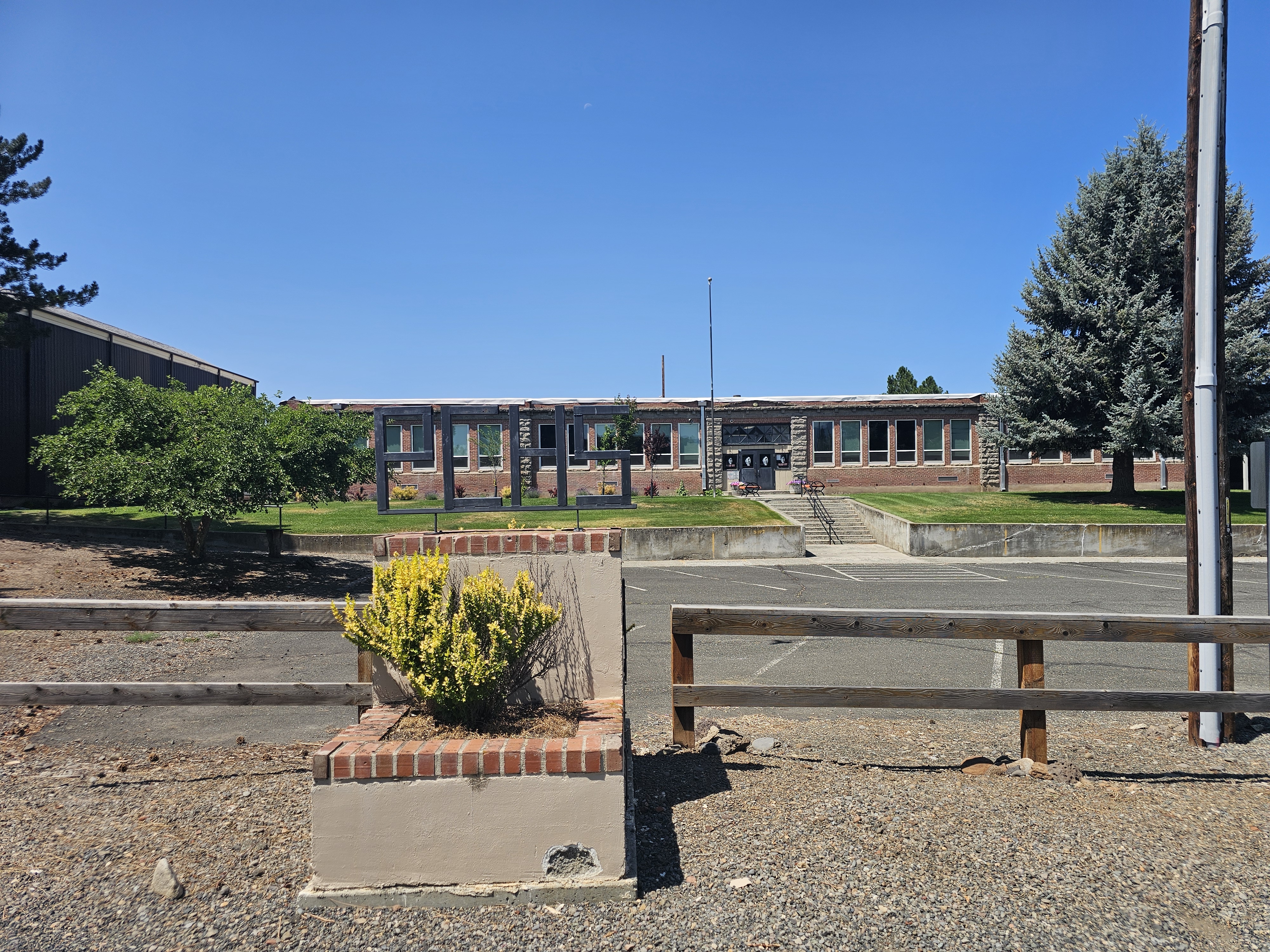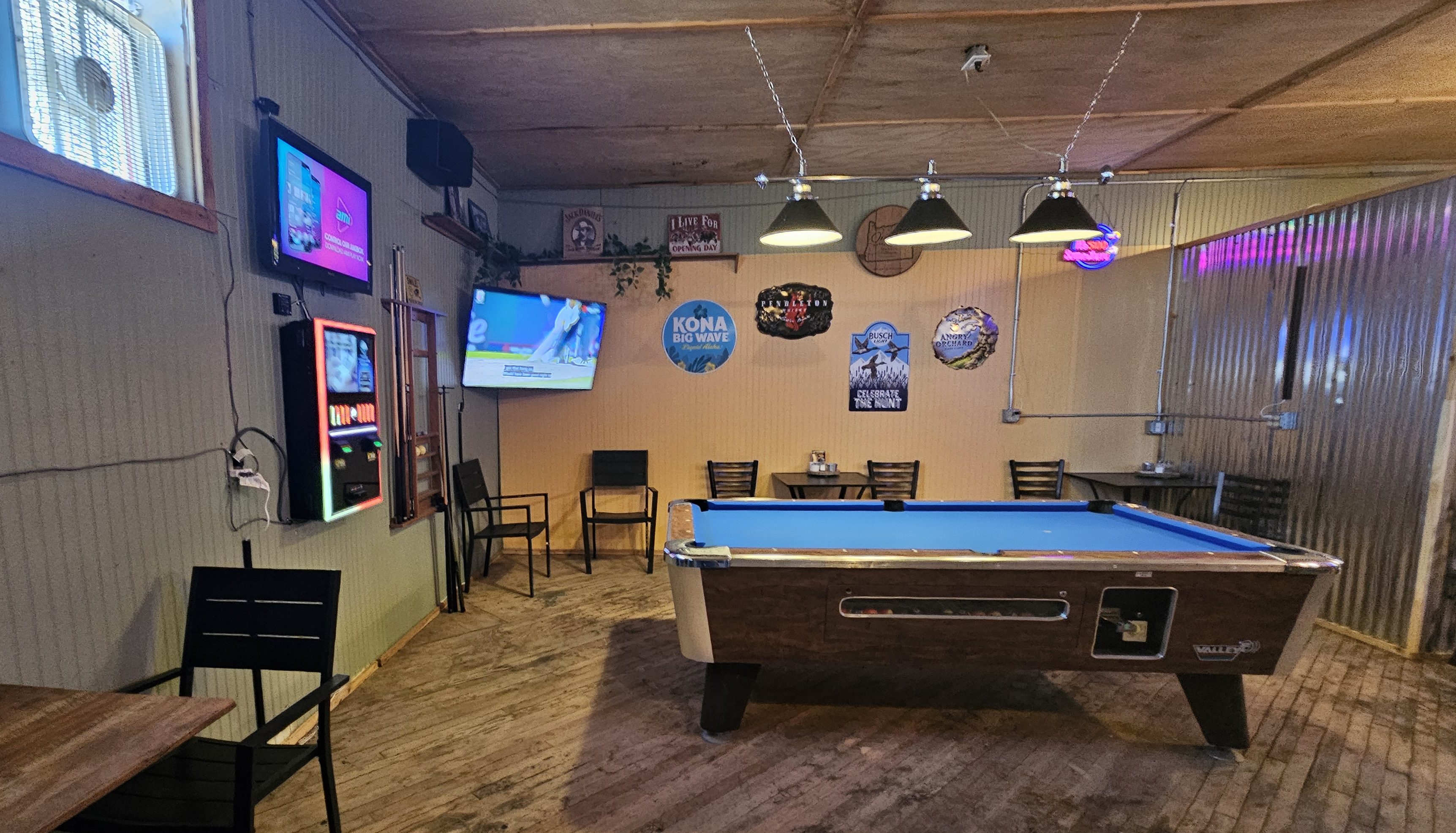Wallowa County students get lecture on government from lawmakers
Published 3:00 pm Tuesday, June 4, 2024

- State Sen. Bill Hansell, R-Athena and Rep. Bobby Levy, R-Echo, pose for a photo with Bre Austin's fifth/sixth-grade class May 22, 2024, at Enterprise Elementary School.
ENTERPRISE — Fifth- and sixth-graders at Enterprise Elementary School got an up-close and personal lesson on state government Wednesday, May 22, from Sen. Bill Hansell, R-Athena, and Rep. Bobby Levy, R-Echo.
Trending
The two lawmakers visited the class of Bre Austin (“Miss Bre”) during a stop in Wallowa County and discussed everything from the nature of government to chocolate pudding to wolves and housing. The mixed-grade class of about 15 students composed questions before the lawmakers’ arrival giving thought to issues they may have had occasion to deal with in the Legislature.
When Hansell and Levy arrived, after introducing themselves, they discussed — you guessed it — government.
“I understand you got to talk to Sen. (Ron) Wyden (via Zoom) recently,” Hansell said. “But we’ll talk more about state government. In our federal government, we have three branches. They are what?”
Trending
He coached the kids to the correct guesses, judicial, executive and legislative.
“Oregon has the same three. … And we’re in the legislative branch, where there are two houses — it’s called bicameral,” the senator said. “What are those two houses?”
Again the kids guessed correctly — the Senate and the House.
“Now, she’s going to disagree with me,” Hansell said of Levy, “but the Senate is the most prestigious.”
Levy wasn’t about to let that rest.
“The House decides the funding,” she said.
Hansell also compared representation in Congress with the Legislature, noting that there are 30 senators and 60 representatives.
He said his Senate District 29 “is the second-largest district geographically in the state of Oregon. We have 17,000 square miles, which is larger than some of the states back East. It goes from Hells Canyon on the Idaho border all the way to the crest of the Cascades.”
Levy’s House District 58 is contained within Hansell’s District 29.
“I have all of Wallowa County, all of Union County and the majority of Umatilla County,” she said.
They talked about the effect of the census taken every 10 years and how that can lead to redistricting. Then the lawmakers took questions from the students on the Legislature itself.
They make laws
“One of the big questions I get is, what does the Legislature do?” Hansell said. “Basically, it’s real simple; we make laws. … Let’s say you want it required that every Friday at every school in the state of Oregon that it be required you get to have chocolate pudding.”
One of the students then informed Hansell that Wallowa County doesn’t have school on Friday.
“Thursday then,” he said. “If you don’t have school Friday, we’d amend it to have it on Thursday.”
He also explained how the Legislature has two sessions: a short, 35-day session in even-numbered years and a longer, 160-day session in the odd-numbered years.
“Unlike in Washington, D.C. where Congress meets all year long, we’re a citizen Legislature so we only meet twice every two years,” the senator said. “This year, we had a short session which couldn’t be longer than 35 days, according to our constitution.”
Wolves
Levy responded to a student’s question about wolf management. She noted that the predators are federally protected west of U.S. Highway 395, but are under state management east of Highway 395. But she told how she talked with a rancher whose land straddles Highway 395, so wolves can travel across it from the zone where they have federal protection to state management without knowing it.
“In Oregon, you can’t just shoot a wolf for any reason, but if you get a permit from the Oregon Department of Fish and Wildlife, you can” east of Highway 395, she said.
She also noted that the city of Enterprise is the only part of Wallowa County that is not an area of known wolf activity.
“Everywhere else in the county of Wallowa is an area of known wolf activity,” she said.
One student asked if wolves had always been here and Levy said no, early settlers who valued their livestock eliminated the wolves early on. They didn’t return until they were reintroduced to Yellowstone National Park in the 1990s and migrated here from Idaho.
“But wolves kill for fun, not because they’re hungry,” she said. “Cougars are the same way; they kill for fun.”
She discussed something the students may be familiar with — protecting their livestock from predators.
“Because I live on a ranch, I know how hard it is to protect your cattle,” she said. “You work long hours … and one wolf can come in and cause major damage. I’m a sheep rancher and have dogs for protection. I have living at my house a dog that is 11 years old now and he’s the only dog I know that has ever killed a wolf. He’s 165 pounds and his name’s Rocko and he looks like a lion. I have the grade school come down every year and pet my two lions.”
She calls them lions because they live outside all winter and grow such thick coats, but by summertime, she has a veterinarian give them a haircut that looks like a lion. She went around the class and showed cellphone pictures of her “lion-dogs,” which intrigued the kids.
Rocko is believed to have killed a wolf because one time, he returned from protecting the sheep with wounds to his rear end and a leg. The dogs wear spiked collars to protect them from wolf bites. He was bloody around the collar — with likely wolf blood.
“We found lots of blood around the trail, but never did find the wolf,” she said.
A student asked if she would’ve been allowed to shoot the wolf and she said that was a case of “caught in the act,” which game law allows a livestock owner to shoot a wolf if it’s caught attacking or harassing livestock, so in such a case, it would’ve been legal to kill the wolf.
Housing
Another student asked if the lawmakers have been able to do anything about the shortage of affordable housing in Oregon.
“What’s the No. 1 thing that we could do to get more affordable housing? What’s the one thing you would need to have if you were going to build more houses?” Hansell asked. He gestured by rubbing the tips of his fingers together.
Someone caught on and said, “Money.”
Hansell responded, “Right, you’d need money. You can’t build a house without money. That’s what we did in the short session, we appropriated $400 million to build affordable housing,” he said.
“In the long session before that, we also appropriated money for affordable housing to be shovel-ready, ready-to-go, but we didn’t have the resources (to fully fund it),” he said.
Growing up
Hansell and Levy also related to the kids with stories of their own years growing up.
Levy, who grew up in town before marrying a farmer, talked some about her kids, the rules they had to live by and how they’re now imposing the same rules on their kids. One area Levy was clear on was screen time and video games and how they limit contact within the family.
“If I had it to do over again, I probably wouldn’t have given them video games,” she said.
Hansell also talked about growing up in a rural area and his experiences in 4-H.
He also recalled getting into trouble a time or two.
“One of the things that happened to me was when we were at the public pool and a girl who was hesitant about getting in was standing at the edge so I came up behind her and gave her a push. Then the lifeguard hollered, ‘Hansell, outta here!’ and he kicked me out, but I was just trying to be helpful.”
That brought a wave of laughter from the kids.
Overall, the lawmakers were impressed by the students and the thoughtfulness of their questions, adding that the kids may have provided them ideas to take back to the Legislature.
“They were asking about things that related to their particular needs and they’re starting to process how this works,” Hansell said.
“I love these kids,” Levy said. “Kids come up with some really great ideas, particularly the housing problem and how to fix that. It’s expensive everywhere. The problem is Wallowa County doesn’t have a lot of space and we tried to do a bill here but the residents of the county didn’t want us to bring housing here because they were concerned that what more people meant to the people who come up and vacation here. … I would love to retire here; it’s such a beautiful place to be. But I think that the vacationers take away from the housing that could be available to people who live here. But they have to make money.”









